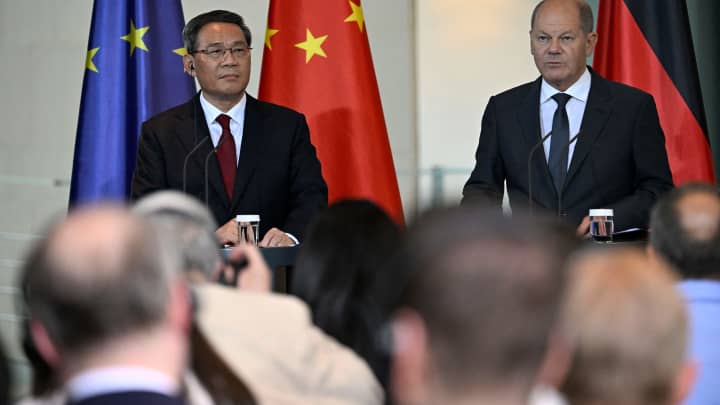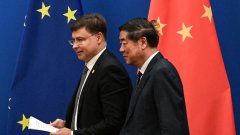
Germany said there is an urgent need for companies to de-risk from China, while "not pursuing a decoupling" of economies.
"For Germany, China remains a partner, a competitor, a systemic rival. But the aspect of systemic rivalry has become increasingly prominent in recent years," Germany's foreign minister Annalena Baerbock at the Mercator Institute for China Studies think tank in Berlin, according to a translation from DW, a German newspaper.
The minister was presenting the country's strategy on China and explaining how the country plans to protect its interests.
"China's economic strategy aims to make it less dependent on other countries, while making international production chains more dependent on China," the foreign ministry said in a published Thursday.
Last week, China , in what was deemed a warning to Europe and the U.S. in a technological war over high-tech chips.
"In terms of foreign policy, China is pursuing its own interests far more assertively and is attempting in various ways to reshape the existing rules‑ based international order. This is having an impact on European and global security," the report said.
"We don't need to look too closely to see that China has changed. Anyone who listens to China knows the self-confidence with which it will decisively influence the development of our world," said Baerbock during her speech.
China's foreign ministry did not immediately respond to CNBC's request for comment.
The Chinese Embassy in Germany said in a that "China hopes that Germany will view China's development rationally, comprehensively and objectively."
"Many of the challenges and problems Germany is currently facing are not caused by China. China is Germany's partner in dealing with challenges, not its opponent," said the embassy.
"Viewing China and formulating strategies toward China based on ideology will only exacerbate misunderstanding and misjudgment, and damage cooperation and mutual trust between the two sides."
The German foreign ministry's report further highlighted that competition among nations is beneficial and that "Germany accepts competition with China." However, it said that competition needs to be "based on fair rules."
"It is not our intention to impede China's economic progress and development. At the same time, de-risking is urgently needed. However, we are not pursuing a decoupling of our economies," said the report.
Germany wants to become "less dependent in critical sectors" such as medical technology, medicinal products and rare earths, the report said. It added that "China has exploited other countries' dependencies in the past," listing semiconductors as an example.
The report also said that "economic and trade relations remain an important element of bilateral cooperation with China" and that Germany wants to ensure this cooperation "becomes fairer, more sustainable and more reciprocal."
China is Germany's largest single trading partner. In 2022, Germany's imports from China from a year ago to 191.1 billion euros ($204.4 billion), according to data from Federal Statistical Office of Germany. Meanwhile, German exports to China rose only 3.1% to 106.8 billion euros.
While "China's dependencies on Europe are constantly declining, Germany's dependencies on China have taken on greater significance in recent years," said the report.
Last month, Chinese Premier to discuss bilateral relations between the two economies.
Li said that China and Germany "enjoy a solid foundation for cooperation and strong dynamics for development."
He also said that China "has every confidence in the prospects of China-Germany cooperation."




